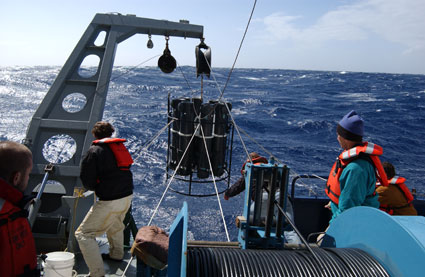A team of marine scientists, including Moss Landing Marine Laboratories Director Kenneth Coale, has found that toxin-producing algae once thought to be limited to coastal waters are also common in the open ocean, where the addition of iron from natural or artificial sources can stimulate rapid growth of the harmful algae. The new findings, reported this week in the Proceedings of the National Academy of Sciences, add to concerns about proposals to use iron fertilization of the oceans as a way to combat global warming.
“This work definitely reveals a wrinkle in these plans,” said Coale, co-author of the study and principal investigator/chief scientist on all U.S.-led iron fertilization experiments to date. “These findings show that it is much easier to break an ecosystem than it is to fix one. In light of these findings, we should re-double our efforts to reduce carbon emissions, the primary culprit for ocean ecosystem damage worldwide.”
SJSU is the administrative lead for Moss Landing Marine Laboratories, a consortium of seven CSU campuses. Coale has advised the U.S. Energy Department and General Accounting Office regarding iron fertilization as a climate mitigation strategy.
Read a related news release from the University of California, Santa Cruz.
http://news.ucsc.edu/2010/11/domoic-acid.html


